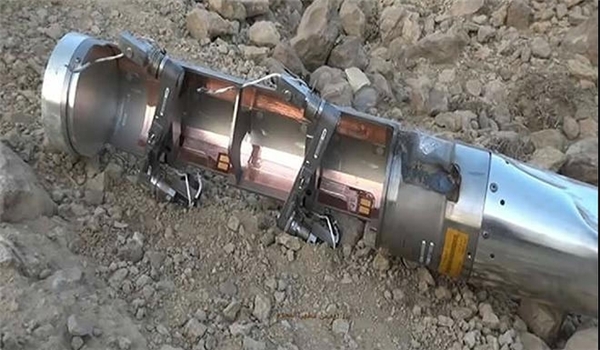
RNA - The residents of al-Malil district in Kitaf city of Sa'ada province came under the Saudi warplanes' cluster bomb raids.
"There were no immediate reports of the possible casualties in al-Malil district of the city of Kitaf, but locals said tens of people have been killed or wounded in the raid," the Arabic-language al-Massira TV quoted a local source as saying on Saturday.
Last week, several Yemeni civilians were wounded in Saudi Arabia's cluster bomb attacks in Shahar region in Sa'ada province.
A human rights watch in its latest report announced in a report that the US helps Saudi Arabia in its air raids on the Yemeni people. It noted that tens of people have so far been killed in the Saudi Arabia's cluster bombs attacks while the bombs had US flags on them.
On Friday, seven civilians were killed and 11 more were injured in Saudi Army's rocket and aerial attacks in the Northwestern Sa’ada province, local media said.
Saudi forces' rocket attack killed five civilians and wounded eight more in the city of Haydan in the Telan district of Sa’ada, al-Masirah tv network reported.
Saudi warplanes also targeted the al-Nazir region of the city of Razeh in the same province, leaving two residents dead and three more wounded.
In later August the UN human rights office said the Saudi military is using cluster bombs against residential areas in Yemen in violation of international law, blaming the Riyadh regime for most of the civilian casualties in its impoverished Southern neighbor.
Also in August, UN High Commissioner for Human Rights Zeid Ra’ad Zeid al-Hussein called for the creation of an independent international body to investigate cases of human rights violations in conflict-ridden Yemen.
"Civilians in Yemen have suffered unbearably over the years from the effects of a number of simultaneous and overlapping armed conflicts,” Hussein said in a statement, adding that “they continue to suffer... while those responsible for the violations and abuses against them enjoy impunity.”
The UN official further said “such a manifestly protracted unjust situation must no longer be tolerated by the international community,” calling for “an international, independent investigative body” to be established.
On May 6, Human Rights Watch (HRW) criticized the United States for selling cluster munitions to Saudi Arabia, urging Riyadh to stop using such banned arms that leave behind unexploded sub-munitions and endanger civilians.
Steve Goose, arms director at HRW and chair of the Cluster Munition Coalition, an international coalition of groups working to eradicate cluster munitions, said Saudi Arabia has used various types of US-made cluster munitions, including CBU-105 Sensor Fuzed Weapons, in its war against Yemen despite evidence of mounting civilian casualties.
Experts say CBU-105 is designed to explode above the ground and project an explosively formed jet of metal and fragmentation downward. The cluster ammunition is equipped with electronic self-destruct and self-deactivation features.
On April 7, HRW said its investigators traveled to a town in Yemen’s northwestern province of Hajjah the day after the attack and identified 97 civilians killed in the strike, including 25 children. The team said another 10 bodies were burned beyond recognition, bringing the total number of victims to 107.
They found fragments of a GBU-31 satellite-guided bomb as well as its guidance equipment supplied by the US, matching an earlier report by British television network ITV.
The US has backed the Saudi campaign in Yemen. In November last year, Washington approved a USD 1.29 billion rearming program for Riyadh, including thousands of similar bombs.
847/940